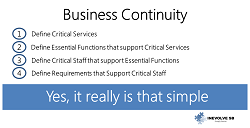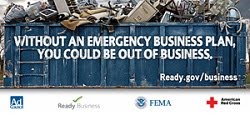By Howard ‘Coach’ Pierpont
More organizations are outsourcing portions of their
operations these days. Concentrating on the core competency for the
organization makes sense in many cases. This allows for the streamlining of
internal operations while maximizing the non-core section by utilizing best in
class third parties.
The people making the decision to go with a third party need
to completely define the statement of work [SOW] and assure that whoever gets
the contract follows the SOW. Let me give you an example of a system that was
implemented and appeared to be working. At least there was money coming in.
I went to a supplier and requested an item be drop shipped to
an east coast location. The supplier had my physical address [not the delivery
address] and my mailing or billing address. The supplier contacted the vendor
and had the product shipped to the proper location. The vendor was responsible
for monthly billing based while I was using the product. Somehow the physical
address was sent to the vendor and not the billing address.
Granted, I am in a community where they are creative on
their street names, but there is a method. My address is 2124 W 17th
Street Road. The vendor input the following address: 2124 W 7th
Street Road. There is no such address, but that didn’t seem to make a
difference to the vendor who was in turn outsourcing their billing process.
Each month they transmitted my information to the billing company. The billing
company outsourced the physical bill creation to another party. Each month a
bill was created, mailed and later returned by the Post Office as
undeliverable.
One month the carrier that handles 7th Street
Road went to see the carrier that handles 17th Street Road and asked
if there was such an address on that street. Yes, 2 different carriers 10
blocks apart, but at least in the same sorting facility. The 17th
Street Road carrier took the mail and put a big question mark on the front and
delivered it.
I opened the mail and it contained 4 past due with
collection notices and a current invoice. I called the customer service number
to get my address fixed. The representative only wanted to set me up for
electronic payment. I finally got to speak with a supervisor. She did agree to
correct the mailing address and remove the dunning messages before sending me
new copies of the invoices.
Soon in my physical address mailbox came the invoices
without the dunning messages. Another call revealed a significant flaw in the
process. It turns out the process between the billing company and the people
that create the physical bill is to create the bill first, make the hardcopy
and mail the hardcopy bill. Then in a following process they do the address
changes.
Another call to customer service to get the address
corrected indicated that their process sequence was flawed. I asked for a good
invoice with no penalties for still not having paid.
This took 6 months of my working with either no bills or incorrect
bills. This took time on my part to initialize the calls and, on the customer
service side, to talk to me and try to resolve the issues. Ultimately this was
resolved.
Customer service is a cost to any organization. The best run
customer service group can reduce their own costs, adding money to the bottom
line as well as potentially up selling the customer due to the positive
customer service.
If an organization is going to use a third party to handle
the non-core business processes, the methodology needs to be highly defined. It
also needs to be tested and reviewed. Someone needs to assure that excellent
service is delivered to the customer.
If the process is flawed in daily practice, it will not
serve the organization well during a crisis or in recovery. Tabletop tests will
not always show how things will work in a disaster situation.
A great Business
Continuity Practitioner needs to ask the business how the business knows the
process really works. Use of the
Socratic approach to the BIA and reviews will serve every BCP well.
About Howard Pierpont
With almost 30 years of Business Continuity experience, ranging from global large-scale precision manufacturing to small, stand-alone single site operations, Howard has an extensive and unique background in merging business continuity into continuous operations.
He is a Charter Member of ICOR and is currently an instructor and training partner with ICOR. Currently, as a DHS/FEMA Reservist Community Recovery Specialist, he works with businesses, nonprofits and municipal governments in communities having received federal disaster declarations. Howard also serves as Board Chair for the Disaster Preparedness and Emergency Response Association.
______________________________________________________











4 Comments:
Thanks for sharing real information. Nice post, keep Posting brother. ISO 22301 Certification Oman
Very useful information Sir. Thanks for sharing!
Internal Auditor Training
Nice post!
ISO 14001
Very nice article..
ISO 22301 Lead Auditor Course Online
Post a Comment